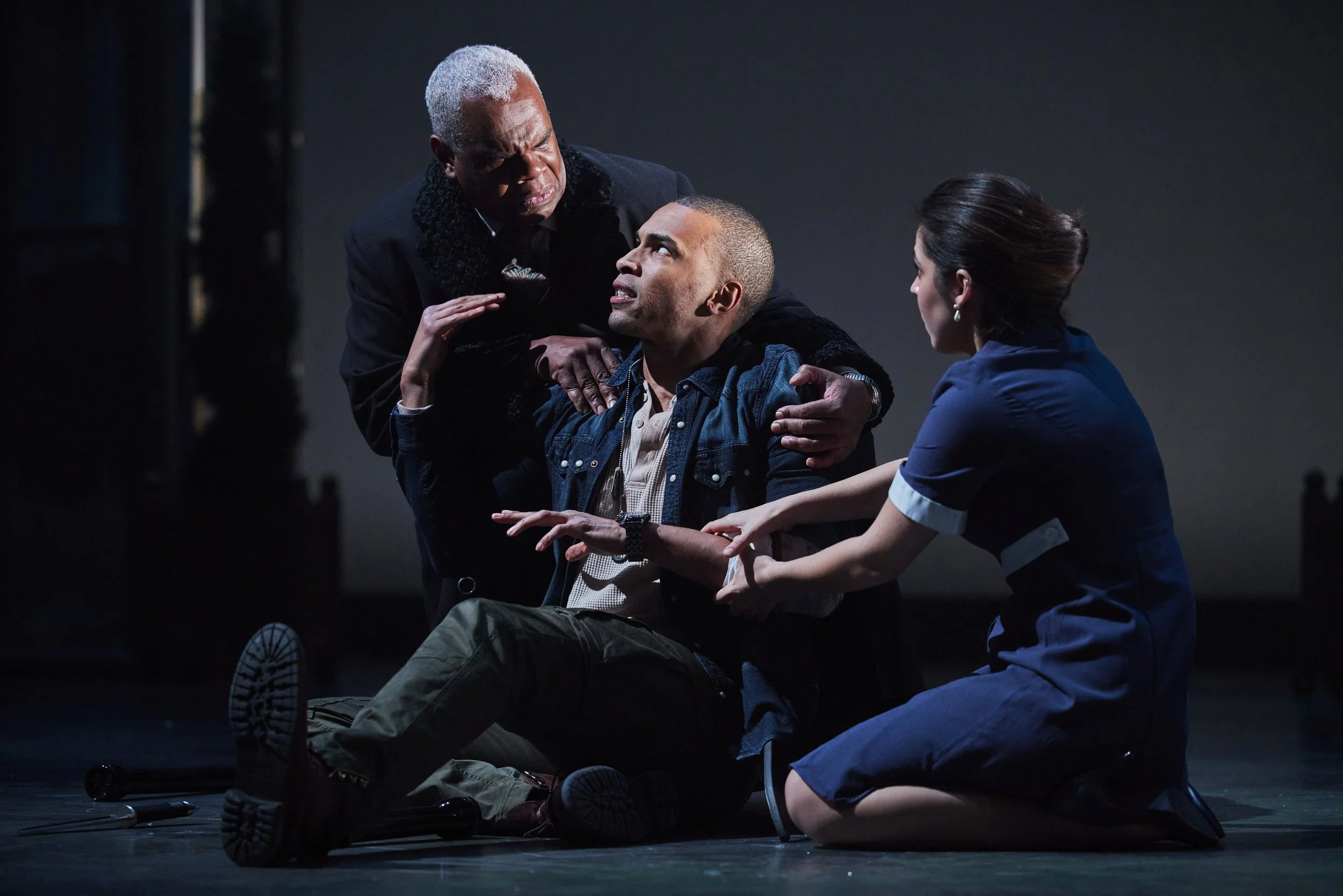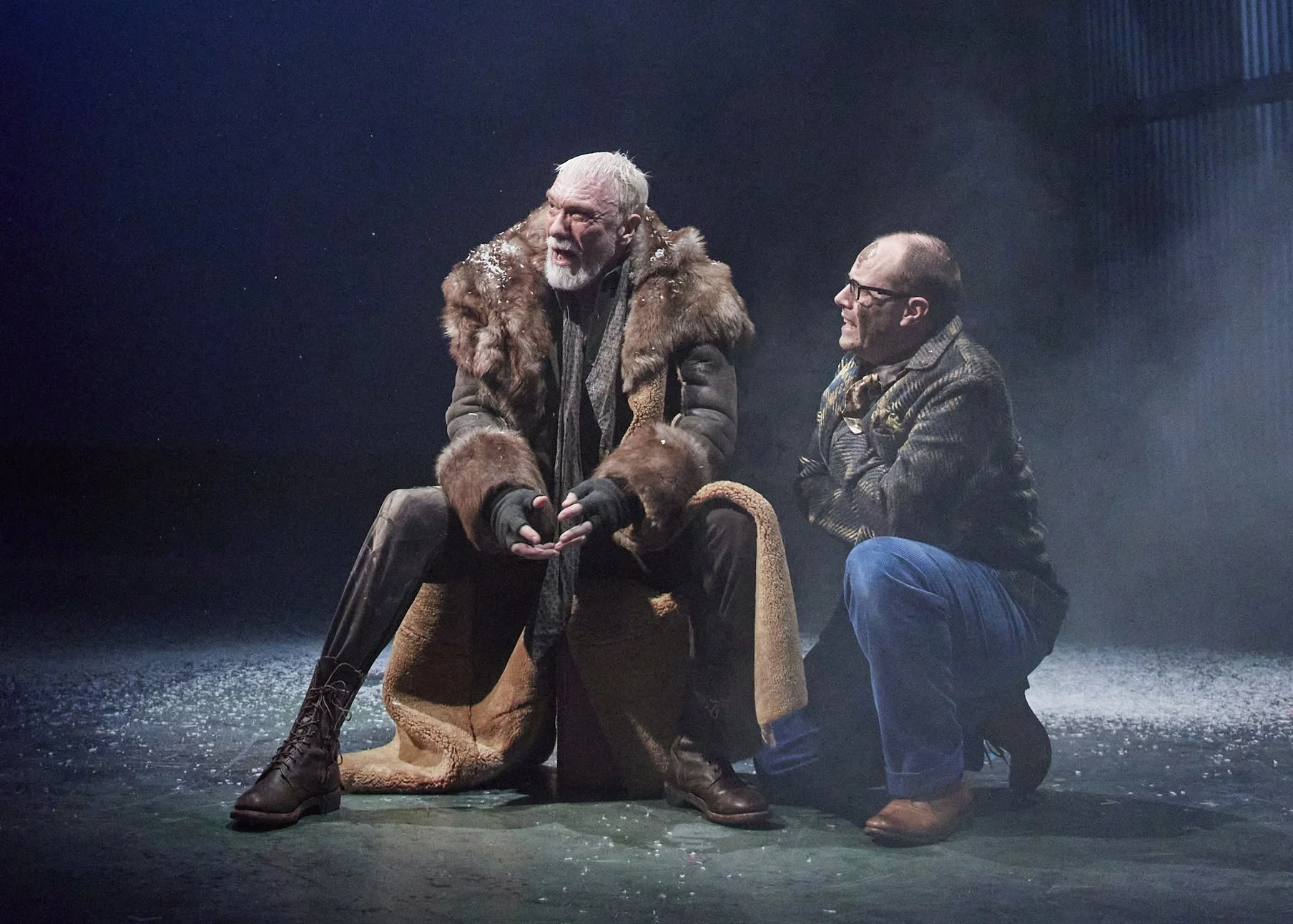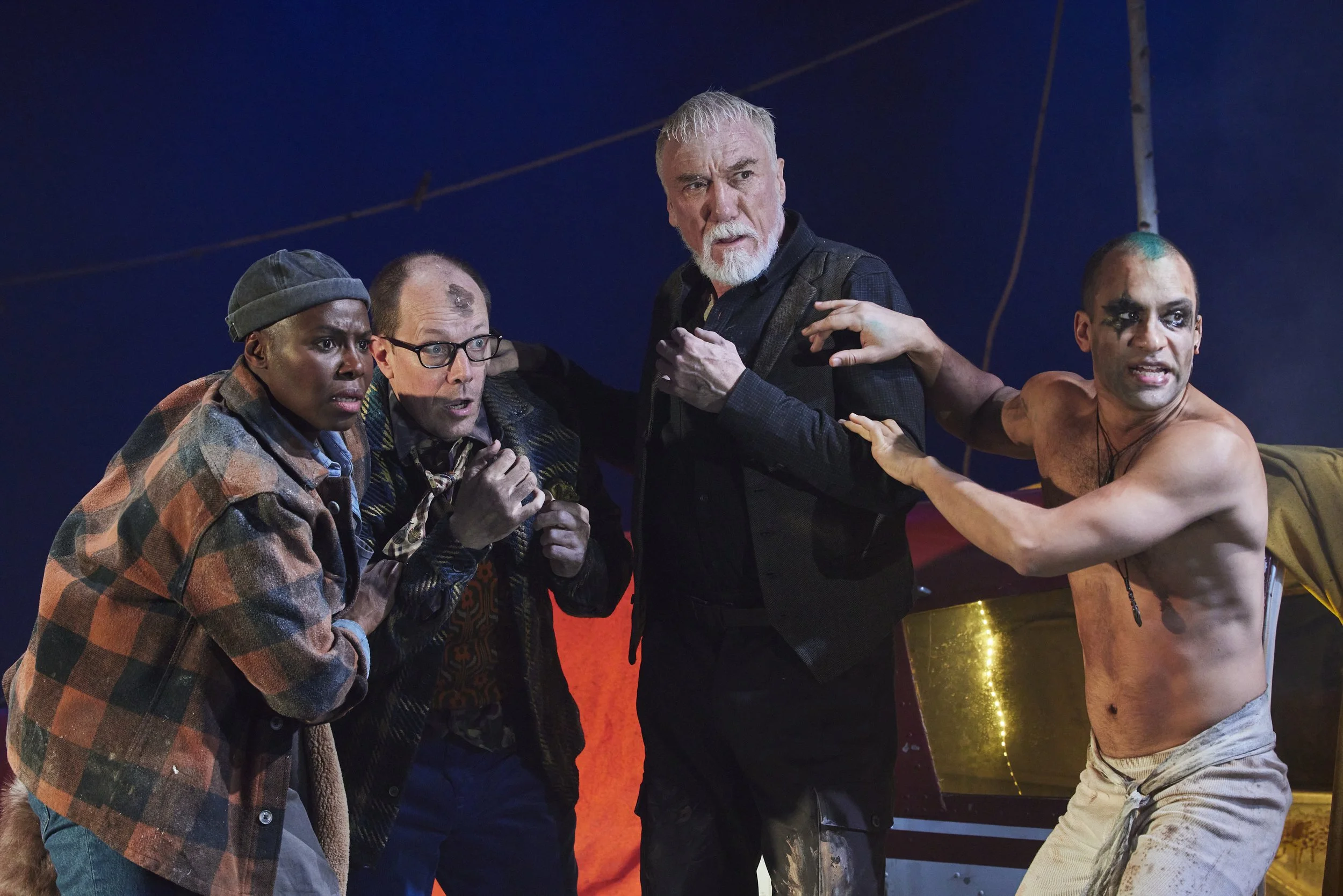A Deeply Human 'King Lear' at the Shakespeare Theatre
Photo of Patrick Page in King Lear by DJ Corey Photography.
Review by Norah Vawter
The Shakespeare Theatre’s highly anticipated King Lear renders the 417 year-old work new, surprising, and yes, relevant for today. Lear has a reputation as one of William Shakespeare’s most difficult plays to do well, but this new production, directed by the company’s artistic director Simon Godwin, never gets bogged down in its complicated plotlines, nor does it make the madness of King Lear bizarre or inscrutable. Instead, we’re offered a deeply human story, in which the personal becomes political, family conflicts bring a kingdom to its knees, and I find myself emotionally wrecked, in a good way.
Venerable actor Patrick Page plays Lear not as a king or a madman, but as a man. He’s loud, brash, funny, larger than life, and yet he’s so relatable. It’s hard to watch as Lear loses his grip on his children, his kingdom, and reality. Indeed across the board, the talented and diverse cast is able to find their characters’ humanity within the elevated language and lay that humanity bare. The production is unflinching as it explores the ways we break and mend each other. What could be more relevant than that in 1606 or 2023?
Photo of Lily Santiago, Stephanie Jean Lane, and Rosa Gilmore in King Lear by DJ Corey Photography.
The story is based on an ancient legend, though before Shakespeare got ahold of it, it generally ended happily. In Shakespeare’s play, the aging king of England, Lear, intends to divide his kingdom between his three grown daughters to prevent future strife. But when his youngest, most loving daughter, Cordelia (Lily Santiago), refuses to go along with a hollow exercise of flattery, the vain king loses his temper. In a fit of rage, foreshadowing his later madness, he banishes his favorite child.
Soon the kingdom is destabilized by Lear’s descent into dementia and the fickle moods and schemes of elder daughters Goneril and Regan (Rose Gilmore and Stephanie Jean Lane). Edmund (Julian Elijah Martinez), the ambitious, illegitimate son of Lear’s trusted friend Gloucester (Craig Wallace), sees an opportunity and seeks power for himself, betraying his father and brother Edgar (Matthew J. Harris). These two family tragedies unravel in parallel, and the kingdom collapses into chaos and violence.
Photo of Craig Wallace, Julian Elijah Martinez, and Bekah Zornosa in King Lear by DJ Corey Photography.
The whole ensemble is brilliant, but Gilmore and Lane stand out playing the petty, nasty Goneril and Regan. Martinez’ Edmund is delightfully conniving and depraved, but I also see a vulnerability, the wounded boy beneath the bravado. Harris shows incredible range as the wronged Edgar, who undergoes a startling transformation and demonstrates that a hero can be just as interesting as a villain.
Emily Rebholz’s savvy, stylish costume design sets the play firmly and unobtrusively in modern times. We don’t question Lear’s fur-adorned leather coat, the modern military uniforms, or Goneril and Regan’s skintight pants, and the specificity and flair lend authenticity to the modern setting. Likewise, scenic designer Daniel Soule uses spare but grounded staging to imply a rich, contemporary world. The lighting and sound by Jeanette Oi-Suk Yew and Christopher Shutt, respectively, fill out this world, rooting us in the story throughout frequent shifts in plot and setting. During a brutal storm and later war, the effects are immediate, primal, immersive.
Photo of Patrick Page and Michael Milligan in King Lear by DJ Corey Photography.
I’ve never seen Lear before, and it was a special pleasure to experience this legendary play for the first time, done so beautifully. Having heard much about the “madness of King Lear,” I expected the king’s behavior to be stranger, crazier, less relatable. At first, Page shows Lear’s “madness” as simply angry outbursts and foolish, sudden changes of plan. Later he descends into what seems like Alzheimer’s. But even as Lear loses touch with reason, his surroundings, himself—there’s nothing stereotypically deranged in his behavior. In the hands of another director, or lead actor, I can imagine the audience unable to follow Lear’s ramblings, or connect with the emotional odyssey of character who could seem unrelatable.
Too often in fiction, people suffering from mental illness are depicted as not quite human, as “other.” This production accomplishes the opposite. Indeed, Patrick Page’s Lear displays many moments of reason and kindness, even in the depths of his madness. But these small moments, opportunities for us to empathize with the character, could be lost by a less skillful director. I experienced Lear as arrogant and brash, but fundamentally decent, which makes his downfall all the more tragic. Yes, the king brings on his own demise, but not because he’s evil. Because he’s alive.
Photo of Shirine Babb, Michael Milligan, Patrick Page, and Matthew J. Harris in King Lear by DJ Corey Photography.
Nothing’s perfect, not even Shakespeare, and though the ending is stunning, the runup feels rushed. The Bard himself may be to blame—the play has a long middle, so it must hurry near the end. I think Godwin could slow the pace towards the end and pick up the pace earlier. But these are minor quibbles. When we reach the conclusion, it’s shocking, heartbreaking, and beautifully human. I fought back tears as I had several times before. The Shakespeare Theatre’s King Lear is superb, and I feel lucky that it was my first. Like the best theatre, this show didn’t just entertain me. It brought me to a new place, and I’m still turning it over in my mind.
Running time: Two and a half hours, with an intermission.
King Lear plays through April 16, 2023, at the Shakespeare Theatre’s Klein Theatre—450 7th Street NW, Washington, DC 20004. For tickets, call the box office at (202) 547-1122 or purchase them online.
Norah Vawter is DCTRENDING’s local authors editor. She has an M.F.A. in creative writing from George Mason University and is querying her first novel. She lives with her family in Northern Virginia. Follow her on Twitter @norahvawter, where she shares words and works of D.C. area writers every Friday.





